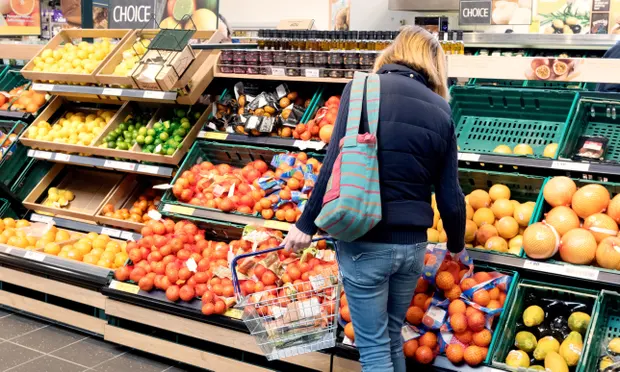UK inflation jumped unexpectedly in February after food prices surged at their highest rate for 45 years, piling pressure on the Bank of England to increase interest rates again this week.
Adding to the squeeze on household incomes, the consumer prices index (CPI) accelerated to 10.4% from 10.1% in January, with prices driven higher by a rise in the cost of drinks, women’s clothes, meals out and fresh food as salad items ran short.
The price of goods and services have now increased dramatically since last year when the official inflation rate was nearer 6% and by 17.2% over the past two years. Inflation was close to zero in February 2021.
Labour accused the government of making families worse off, while business leaders said they were concerned that Britain was being damaged by persistently high inflation.
The latest figures are likely to add to pressure on the Bank of England to raise interest rates on Thursday, despite growing fears over the unfolding crisis of confidence in the global banking system after the failure of Silicon Valley Bank in the US earlier this month and the weekend rescue of the Swiss lender Credit Suisse.
Rob Morgan, the chief investment analyst at the stockbroker Charles Stanley, said Britain’s high inflation rate “kept coming back, like the Terminator” and gave the Bank of England’s policymakers “every reason to hike interest rates” when they meet on Thursday.
The ONS blamed a sharp increase in the cost of fresh food and non-alcoholic drinks, the rising price of restaurant meals and a surge in the price tag on women’s clothes for reversal in a recent decline in inflation.
The salad crisis, which resulted in empty shelves once occupied by tomatoes, peppers and cucumbers, was highlighted by the ONS as the driving force behind the rise in fresh food costs. The cost of vegetables rose 18% in the year to February – the highest rate since February 2009.
Rising food prices have also pushed up inflation in the last month in France, Spain and Germany, though at much lower levels than in the UK.
Core inflation, which strips out volatile items such as food and energy, also increased sharply to 6.2% in February, up from 5.8% the previous month, exceeding economists’ expectations of a slowdown to 5.7%.
The increase in the price of services is likely to fuel concerns that large corporations have protected their margins, using the cost of living crisis to “disguise price rises”. The Unite union general secretary, Sharon Graham, has accused companies of “greedflation” after it was revealed that several large companies, including Nestlé and Procter & Gamble, have increased profits and margins over the last year.
Energy prices also played a part in the inflation figures, though to a lesser extent than a year ago, pushing down the cost of transport. Britain remains one of the countries most dependent on imported food and energy in the industrial world.


